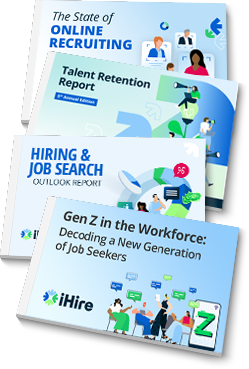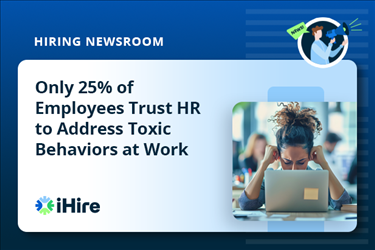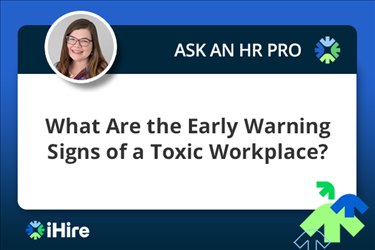- Employer Resources
- |
- Last Updated: April 03, 2025

Best Practices for Managing Conflict at Work & Strengthening Your Team
No workplace is immune to conflict. A heated disagreement between coworkers or a strained exchange with a manager can quickly affect the whole team’s spirit. Productivity dips, and negativity spreads. What turns these moments into opportunities instead of obstacles?
According to iHire’s 2025 Toxic Workplace Trends Report, 74.9% of employees have encountered a toxic workplace, with 58.8% attributing the toxicity to conflict or hostility, which includes bullying, harassment, and arguments.
Leaders and HR teams face a pressing need to address these issues. Managing conflicts at work starts with understanding their causes, and then looking at actionable strategies and best practices to resolve tensions, either among multiple employees or between employees and their managers.
Understanding the Roots of Workplace Conflicts
Conflicts often arise from miscommunication, differing priorities, or personality clashes. Picture two designers racing to meet a client deadline: One assumes the other will handle the visuals, but neither clarifies – and the project stalls. Or consider a manager who insists on daily reports, clashing with a team member who values autonomy, leaving the group tense and divided.
Data from the 2025 Toxic Workplace Trends Report highlights how unresolved hostility damages morale and productivity. Recognizing these triggers allows leaders to act swiftly. Does your organization proactively identify the sources of such conflicts, or do issues worsen below the surface, waiting to blow up?
Addressing these roots requires clarity. Managers should encourage open conversations to uncover underlying issues. Employees need a safe space to voice their concerns without fear of retaliation. Taking these steps lays the groundwork for effective workplace conflict resolution.
Encouraging Open Communication
Open communication is integral to managing conflicts in the workplace. Employees hesitate to share their grievances when they feel unheard. A junior staff member might avoid confronting a colleague about a missed deadline, allowing resentment to build. Managers can break this cycle by modeling transparency. Hosting regular team check-ins and meetings creates an environment where people can speak freely.
Training programs can also improve communication skills. Employees learn how to manage conflicts at work by articulating their needs without escalating tensions. To prompt constructive input, a manager might ask, “How do you suggest we handle this?”
Communication can turn conflict into collaboration when handled with care.
Setting Clear Expectations
Unclear roles often ignite disputes. Two team members might argue over who handles a project, with each assuming the other bears responsibility. Managers who clearly define duties eliminate this confusion. A clear job description prevents overlap and reduces friction. Why leave room for ambiguity when precision resolves so much?
Schedule quarterly performance reviews to clarify your goals. Offer specific feedback – praise a completed task, and then perhaps suggest one area to refine. This openness helps employees know their standing and prevents confusion, which leads to arguments.
Implementing Mediation Strategies
Sometimes, conflicts escalate beyond simple fixes. A disagreement between two employees over resource allocation might disrupt an entire department. Managers must step in as neutral mediators. They listen to both sides, gathering facts without bias. To shift the focus toward actionable solutions, a skilled mediator asks, “What outcome do you both want?”
Structured mediation sessions work well here. Each party presents their view, followed by a joint discussion. The manager guides them to a mutual agreement, documenting the resolution. This approach prevents issues from recurring and restores trust when emotions run high.

Leveraging Emotional Intelligence
Emotional intelligence – the ability to understand and manage emotions – plays a significant role in managing conflict at work. A manager notices an employee’s frustration during a heated meeting. Instead of ignoring it, they address it privately, asking, “What’s driving your reaction?”
This awareness defuses the tension before it spreads. Employees with high emotional intelligence also handle disputes better, empathizing with their colleagues’ perspectives.
Hiring for this trait pays off. Companies benefit from employees who gracefully handle stress and disagreements, and leaders who prioritize emotional intelligence create a more cohesive workforce.
Promoting a Positive Work Environment
A supportive culture reduces the frequency of conflicts. Employees are more likely to excel in settings where respect prevails. Managers should set the tone by recognizing achievements and appreciating employees. A team member who feels valued rarely lashes out at others. Vickie Krolak, Senior HR Business Partner at iHire, explains that even small gestures of gratitude boost morale. So never downplay the power of a small “well done” or “thank you.”
Policies also play a role. Anti-bullying guidelines deter hostility, while wellness programs ease stress. A positive environment acts as a buffer against conflict.
Training Managers to Handle Employee-Manager Tensions
Conflicts between employees and their managers demand special attention. A manager’s harsh feedback might alienate a team member, sparking defiance. Remember the saying, “People don’t quit jobs; they quit bad bosses”?
Training equips managers to deliver criticism constructively. They learn to say, “Here’s where we can improve together,” rather than pointing fingers.
Role-playing scenarios sharpen these skills. Managers practice calmly responding to pushback. Employees, in turn, feel respected rather than attacked. This training bridges the gap, aligning both parties toward shared goals. Effective leaders turn potential clashes into growth opportunities.
Reach Qualified, Career-Focused Talent You Won't Find Anywhere Else
Create Your Account Today

We Value Your Privacy
Resolving Conflict Through Collaboration
Collaboration transforms disputes into progress. Two employees arguing over a project’s direction might find common ground through joint problem-solving. Managers can facilitate this by assigning them a shared task. Working together shifts their focus from rivalry to teamwork.
Group brainstorming sessions also help. Employees contribute ideas, diluting their stakes in the conflict. Managers guide the process, making sure everyone’s voice is heard. This method, rooted in workplace conflict resolution, builds stronger bonds. Collaboration proves that unity outshines division.
Addressing Persistent Issues
Some conflicts linger despite everyone’s best efforts. If a manager repeatedly clashes with an employee over their work style, this can affect the whole team’s morale. HR teams can step in to assess these patterns and recommend coaching or a role change to break the cycle. Such persistent issues may signal a deeper mismatch.
Documentation supports this process. Managers can track incidents to identify trends and tackle them head-on to protect the company’s culture. Ignoring such incidents risks a broader fallout.
Building a Better Workplace by Managing Conflict at Work
Managing employee conflicts requires intentional strategies. Open communication, clear expectations, and emotional intelligence pave the way. Mediation and collaboration turn disputes into progress. Leaders who prioritize these practices strengthen their teams.
For more expert insights on hiring, retention, and creating a healthier work environment, visit our Resource Center.
RELATED RESOURCES
Hiring? You're in the Right Place.
- Reach unique talent: 51% of our candidates aren't using other job boards
- Connect your ATS and get 6x more applications with iHire's apply process
- Get matching candidate resumes sent straight to your inbox
We Value Your Privacy




